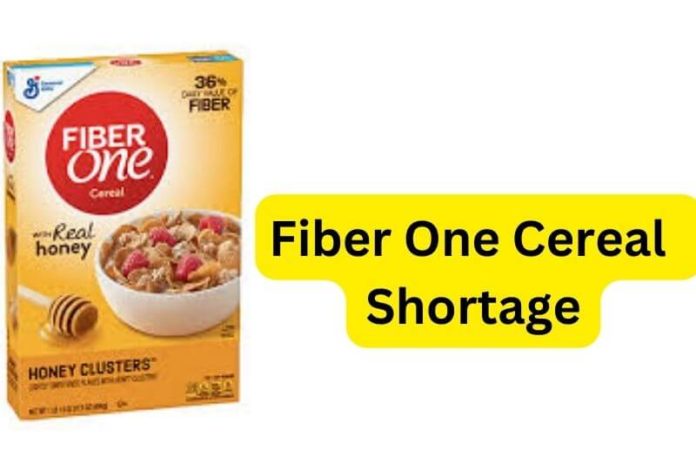Fiber One cereal has been a popular choice among health-conscious consumers for years, providing a tasty and nutritious option for breakfast. Recently, however, there has been a noticeable Fiber One cereal shortage on supermarket shelves.
This blog post delves into the history of Fiber One cereal, explores the reasons behind the shortage, and discusses its impact on shoppers and the brand itself.
History Of Fiber One Cereal
Fiber One cereal was introduced by General Mills in 1985, with the aim of providing a high-fiber, low-calorie breakfast option. Made primarily from wheat bran and whole grain oats, Fiber One quickly gained a reputation for being a healthy and filling choice for those looking to start their day off right.
Over the years, the brand has expanded its product line to include various flavors and additional products, such as Fiber One bars and brownies, further solidifying its position as a trusted source of high-fiber foods.
Is There A Fiber One Cereal Shortage?
There is, indeed, a shortage of fiber one cereal. Many consumers have reported difficulty in finding Fiber One cereal on store shelves. Shoppers have taken to social media to express their frustration with the apparent shortage, fearing that their favorite breakfast option may be gone for good. This has left many wondering if there is indeed a Fiber One cereal shortage, and seeking answers as to why this has occurred.

Why Was There A Fiber One Cereal Shortage?
There are several factors that have contributed to the Fiber One cereal shortage. Firstly, the COVID-19 pandemic has disrupted global supply chains, making it difficult for manufacturers to obtain the necessary ingredients and packaging materials. This has led to a reduction in production capacity and, subsequently, a shortage of Fiber One cereal in stores.
Additionally, the pandemic has also led to a surge in demand for healthy, shelf-stable food options as consumers stock up on essentials. This increased demand for Fiber One cereal has put further strain on the already limited supply, exacerbating the shortage.
Related Article:
Try Other Options
There are many alternatives to Fiber One cereal, depending on what you’re looking for. Here are a few options:
1. All-Bran Original
A classic high-fiber cereal made with wheat bran flakes. It has 13 grams of fiber per serving and is a good source of iron.
2. Bran Flakes
Another good source of fiber, with 8 grams per serving. Bran Flakes are also a good source of vitamin B6.
3. Kashi GOLEAN Original
This cereal is made with whole grains and flaxseed, which gives it a whopping 14 grams of fiber per serving. It’s also a good source of protein and iron.
4. Special K Protein Plus
If you’re looking for a high-fiber cereal with a bit of protein, Special K Protein Plus is a good option. It has 10 grams of fiber and 10 grams of protein per serving.
5. Quaker Oatmeal Squares
Oatmeal is a great source of fiber, and Quaker Oatmeal Squares are a convenient way to get your daily dose. One packet has 5 grams of fiber. You can add nuts, seeds, or fruit for extra nutrients and flavor.
Impact On Shoppers
The Fiber One cereal shortage has undoubtedly caused frustration for loyal customers who rely on this nutritious breakfast option. Many have expressed disappointment at having to switch to alternative brands or products, which may not offer the same health benefits or taste as Fiber One.
Moreover, some shoppers have resorted to purchasing Fiber One cereal at inflated prices through online retailers, which further highlights the impact of this shortage on consumers.
Challenges Faced by Fiber One Cereal
The Fiber One cereal shortage presents several challenges for the brand. Firstly, it must work to quickly address the supply chain issues and ramp up production to meet consumer demand. Failure to do so may result in a loss of customer loyalty, as shoppers turn to alternative products to meet their dietary needs.
Secondly, the brand must also contend with the potential negative impact on its reputation. The shortage may lead some consumers to question the reliability of Fiber One as a product, which could ultimately affect sales even after the supply issue has been resolved.
Which Country is Fiber One Cereal Made?
Fiber One cereal is a product of the United States, made by the renowned multinational corporation, General Mills. Headquartered in Minneapolis, Minnesota, General Mills has been a leading name in the food industry, serving breakfast delights to millions across the globe. The company is dedicated to producing high-quality, nutritious cereal options, and Fiber One is a testament to this commitment.
Can I Still Buy a Fiber One Cereal?
While the shortage has indeed affected availability, it’s not impossible to find Fiber One cereal. Some local grocery stores and online retailers may still have stock. In any case, accessibility might change in light of your area.In the wake of the Fiber One Cereal shortage, the company has urged consumers to try their other nutritious and delicious offerings.
Why Do People Love Fiber One Cereal So Much?
Fiber One cereal has carved its niche in the breakfast market due to its health benefits and delectable taste. It is loaded with 40% daily value of fiber, making it a favorite among health-conscious consumers. The cereal’s ability to keep you feeling full longer is another reason why it’s a staple in many households. Plus, who can resist the delightful crunch and lightly sweetened taste?
When Will the Fiber One Cereal Shortage End?
Unfortunately, there’s no definitive answer to this question as it largely depends on various factors such as raw material availability, production capacity, and logistics. General Mills, however, has reassured customers that they’re working tirelessly to resolve the shortage and get Fiber One back on the shelves as soon as possible.
Conclusion
The Fiber One cereal shortage is a concerning issue for both consumers and the brand itself. With supply chain disruptions and increased demand due to the COVID-19 pandemic, it is crucial for Fiber One to address these challenges promptly and effectively.
By doing so, the brand can ensure that its loyal customers can continue to enjoy their favorite high-fiber breakfast option and maintain its reputation as a trusted source of nutritious, delicious food.
FAQs – Fiber One Cereal Shortage
Is There a Shortage of Fiber One Cereal?
Yes, there have been ongoing supply chain issues impacting the availability of Fiber One Cereal.
When Will the Shortage be Over?
In October 2023, General Mills anticipated a return to normal stock levels. However, it’s April 2024, so the situation might have changed.
Is Fiber One Cereal Discontinued?
No, there’s no indication that Fiber One is being discontinued. The shortage is a temporary supply chain issue.
Where Can I Find Fiber One Cereal?
Availability can vary depending on your location. You can try checking online retailers or smaller grocery stores that might have better stock.
Are There any Alternatives to Fiber One Cereal?
Yes, there are other high-fiber cereals available. You can also explore other fiber-rich options like fruits, vegetables, and whole grains.

